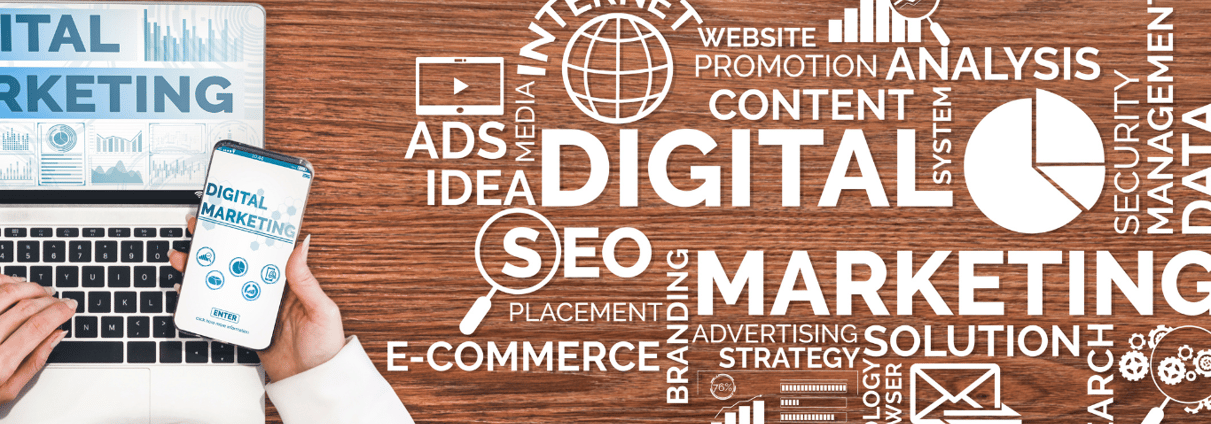Transforming Ideas Into Seamless Digital Experiences
Importance of Digital Marketing for Any Business
Digital marketing expands a business's reach and enhances customer engagement through online platforms. It is a cost-effective strategy that drives growth and boosts sales.
M.Azam


The Importance of Digital Marketing for Any Business
In today’s technology-driven world, digital marketing has emerged as an indispensable tool for businesses aiming to thrive in a highly competitive marketplace. Regardless of the industry or size, businesses can no longer rely solely on traditional marketing methods to reach their audience. Digital marketing provides a dynamic, cost-effective, and measurable way to connect with customers, build brand awareness, and drive growth. This article explores why digital marketing is essential for any business and how it can significantly contribute to success.
1. Enhanced Visibility and Global Reach
One of the most significant advantages of digital marketing is its ability to transcend geographical boundaries. With traditional marketing methods, businesses are often confined to local or regional markets. However, digital marketing enables companies to showcase their products and services to a global audience. Through strategies like search engine optimization (SEO), pay-per-click (PPC) advertising, and social media campaigns, businesses can significantly enhance their online visibility and attract customers from all over the world.
For example, a small artisan store in a rural area can sell handcrafted goods to customers across continents through an optimized website and social media presence. This level of accessibility and reach is only possible through digital marketing.
2. Cost-Effective Marketing Strategies
Traditional marketing channels, such as television, radio, and print advertisements, can be prohibitively expensive for small and medium-sized businesses. Digital marketing, on the other hand, offers cost-effective alternatives that deliver high returns on investment (ROI).
For instance, email marketing campaigns, social media advertising, and content marketing are relatively inexpensive yet highly effective in reaching targeted audiences. By carefully analyzing performance metrics, businesses can fine-tune their strategies to ensure optimal use of their marketing budgets.
3. Precise Targeting and Personalization
One of the most remarkable aspects of digital marketing is the ability to target specific demographics, interests, and behaviors. Platforms like Facebook, Google, and Instagram offer sophisticated tools that allow businesses to create highly tailored advertising campaigns.
Personalization further enhances this targeting. By using data analytics, businesses can understand their customers' preferences and create content that resonates with them on an individual level. Personalized email campaigns, dynamic website content, and tailored product recommendations not only improve customer experience but also drive higher conversion rates.
4. Measurable Results and Analytics
Unlike traditional marketing, where tracking the effectiveness of campaigns can be challenging, digital marketing provides businesses with robust analytics tools. These tools allow marketers to measure every aspect of their campaigns, from website traffic and conversion rates to customer engagement and ROI.
For example, Google Analytics and social media insights provide valuable data that help businesses understand what strategies are working and what needs improvement. This data-driven approach enables companies to make informed decisions, optimize their campaigns, and achieve better outcomes over time.
5. Increased Customer Engagement
Engaging with customers in real time is one of the defining features of digital marketing. Social media platforms, chatbots, and email campaigns allow businesses to maintain a constant line of communication with their audience. Responding to comments, messages, and reviews helps build trust and fosters a sense of community around the brand.
Interactive content, such as polls, quizzes, and live videos, also enhances engagement by encouraging users to actively participate. This level of interaction is vital for building long-term customer relationships and loyalty.
6. Adapting to Consumer Behavior
Consumer behavior has undergone a dramatic shift in recent years, with a growing reliance on online platforms for shopping, research, and entertainment. According to studies, more than 80% of consumers research products online before making a purchase. Digital marketing allows businesses to meet customers where they are—online.
With tools like SEO, businesses can ensure their websites rank high on search engine results pages (SERPs), making it easier for potential customers to find them. Similarly, targeted ads on social media platforms can capture the attention of users scrolling through their feeds, increasing the likelihood of a purchase.
7. Building Brand Authority and Credibility
In the digital age, a strong online presence is synonymous with credibility. Businesses that invest in digital marketing establish themselves as authorities in their respective industries. Publishing high-quality content, engaging with customers, and maintaining active social media profiles help build trust and credibility.
For instance, a fitness brand that shares expert advice, success stories, and workout tips on its blog and social media channels will be perceived as knowledgeable and trustworthy. This positive perception translates to higher customer retention and referrals.
8. Flexibility and Adaptability
Digital marketing is highly adaptable and can be tailored to suit changing market conditions and consumer preferences. Whether it’s experimenting with new platforms, adjusting ad budgets, or launching seasonal campaigns, digital marketing provides the flexibility needed to stay ahead of the competition.
For example, during the COVID-19 pandemic, many businesses shifted their focus to e-commerce and online services. Digital marketing played a crucial role in helping these companies adapt to the new normal and maintain their operations.
9. Supporting Small Businesses and Startups
For small businesses and startups, digital marketing levels the playing field. It allows them to compete with larger, more established companies without requiring a massive marketing budget. By leveraging creativity, innovative strategies, and data-driven insights, small businesses can carve out a niche for themselves and gain a loyal customer base.
10. Driving Sales and Revenue
Ultimately, the goal of any marketing effort is to drive sales and revenue. Digital marketing excels in this regard by providing businesses with multiple avenues to convert leads into customers. From PPC campaigns and email marketing to retargeting ads and influencer partnerships, the opportunities for generating revenue are endless.
Moreover, digital marketing allows for upselling and cross-selling through personalized recommendations, encouraging customers to spend more and boosting overall profitability.
